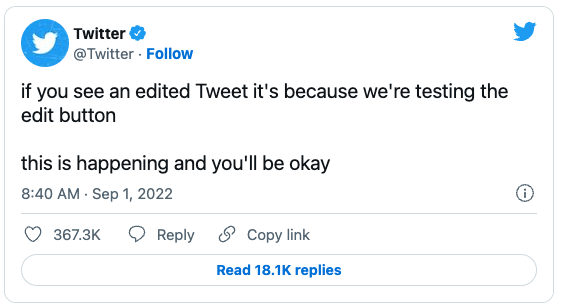In praise of Twitter’s edit button

After years of requests, Twitter is finally testing a button to edit tweets.
Assuming they don’t take it back again — which is certainly possible — the edit button will allow millions of us who use Twitter to post and react to fix our typos. And to the folks who’ve got their panties in a bunch about the potential for abuse, I respond, this is where you’ve chosen to draw the line?
Why edit tweets?
Because we make mistakes, and if they’re benign, correctable mistakes, we ought not be forced to live with them.
Many of us use Twitter as we might blog or post a podcast: that is, to make a point, explain things, or help people. And since we are human and imperfect, those tweets often include factual errors and typos. There’s always been a way to fix that: delete the tweet and retweet. But if a tweet has lots of interactions — likes, quote tweets, and retweets — all that dialogue disappears if you delete the tweet. A similar problem occurs if an erroneous tweet is in the midst of a thread: deleting the tweet breaks the thread, making it harder for people to follow the argument.
I’m in favor of truth and grammatical correctness for people who post online. So count me in favor of the edit button.
Why the potential for abuse is overblown
Edited tweets have the potential to cause problems. Imagine that a bad actor posts a tweet that is benign and generates a lot of interaction, say “Star Wars is more epic than Star Trek — prove me wrong.” The tweet gets thousands of reactions. And the tweeter then edits the original tweet with something different — say “Donald Trump is more epic than Killary Clinton” — or worse, something offensive — say, a video of an axe murder. Horrors — now all of us people who commented on the original tweet are on record endorsing, spreading, and reacting to something completely different from what we originally read.
To protect against the worst abuses, Twitter promises some protections. Edited tweets will have a banner indicating that they were edited, and readers will be able to see the original tweet history. And you’ll only have 30 seconds to amend the tweet — which is generally too short an interval to accumulate a lot of interaction and abuse it.
Twitter should also add a category to its abuse criteria: Tweet meaning edited and changed after original posting. That way, if you get caught retweeting a post that is replaced with an axe murder, you can do more than delete your retweet: you can report the original poster for abuse. Twitter should ban any user who does that a couple of times, or does it a potentially egregious way. This would be easy to add to Twitter’s existing abuse and moderation system.
My big question here is this: does this really increase Twitter’s susceptibility to abuse? People can still masquerade as someone other than they are. They can still post hateful and offensive tweets. They can still delete things after they’ve caused trouble, escaping responsibility for their tweets. They can still post disinformation. The protection against all of these behaviors is for you, the reader, to check content for accuracy, report abusive content, and block offensive people. None of this potential for abuse gets much worse because of an edit button. Facebook’s many flaws aren’t appreciably worse because of its edit button — and the same will apply to Twitter. What’s nasty and awful will remain about the same degree of nasty and awful as before, and what’s benign (that is, tweets in good faith) will get better. So overall, an edit button will improve Twitter.
Everyone deserves access to the edit button
Twitter is currently proposing to restrict access to the edit button to paying Twitter Blue subscribers.
If this is part of the test rollout, fine. But it makes no sense to keep this feature restricted to paying subscribers forever.
True, it would reduce the potential for abuse — trolls are far less likely to be paying for Twitter. But editing is a basic function. Could you imagine a blog platform that didn’t let you edit what you write? Imagine that only paying users of LinkedIn could edit their posts, or that Google Docs restricted the use of the backspace key to paying users.
The scenarios are absurd. Editing is part of writing, and part of posting on social media. It belongs in Twitter. And everyone, paying or not, should have access to it.
Agreed Josh. Now if only edits were allowed by your site’s comments host, Akimet.
See? I would have liked to edit “Agreed Josh” to “Agreed, Josh.”
Yup. And “Akismet” not “Akimet” 😉
🙂